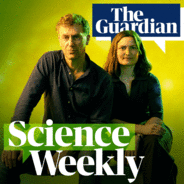Madeleine Finlay is joined by Ian Sample to discuss three intriguing science and environment stories. From a breakthrough in the quest to create organs in the lab to a world-first climate visa that will see citizens relocate from the island of Tuvalu to Australia, plus what happens when two massive black holes collide. Help support our independent journalism at theguardian.com/sciencepod

Wissenschaft & Technik
Science Weekly Folgen
Twice a week, the Guardian brings you the latest science and environment news
Folgen von Science Weekly
300 Folgen
-
Folge vom 17.07.2025Two black holes collide, lab-grown organs, world’s first climate visa
-
Folge vom 15.07.2025Why are parents using melatonin to help their kids sleep?Guardian feature writer Rhiannon Lucy Cosslett recently wrote about the growing cohort of parents whose children are on the waiting list for an autism or ADHD diagnosis, and are turning to the internet to buy melatonin to help them sleep. She tells Madeleine Finlay about their experiences and what is driving them to the hidden market. Paul Gringras, a consultant in paediatric sleep medicine and neurodisability, and lead of sleep medicine at King’s College London, also explains why melatonin can be helpful for neurodivergent children and why he is concerned about the increasing number of parents looking for it online. Help support our independent journalism at theguardian.com/sciencepod
-
Folge vom 09.07.2025Texas floods and forecasting cuts: a sign of things to come?In the days since the deadly floods in the Texas Hill Country, speculation has grown about whether cuts to US weather agencies may have contributed to the the number of casualties. Ian Sample talks to the meteorologist and climate journalist Eric Holthaus to find out whether this narrative stacks up and what the consequences could be for extreme weather prediction in the future. Help support our independent journalism at theguardian.com/sciencepod
-
Folge vom 08.07.2025What are microplastics doing to our health?The actor Orlando Bloom recently posted a photo of himself undergoing a £10,000 procedure at a London clinic that claims to remove microplastics, forever chemicals and herbicides from the blood. But how settled is the science around the health risks of microplastics? To find out, Ian Sample speaks to Dr Stephanie Wright, associate professor of environmental toxicology at Imperial College London’s school of public health. She explains what we know so far about the effects of microplastics in the body, why the science is still evolving, and what we can do to reduce our exposure. Help support our independent journalism at theguardian.com/sciencepod
